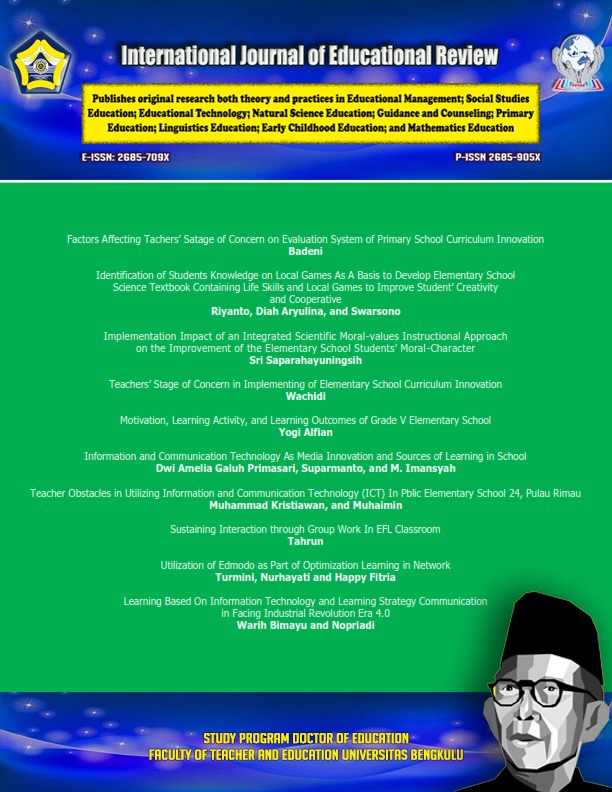Influence Of Professional Development Programmes On Basic School Teachers’ Classroom Practices In North-Central Nigeria
DOI:
https://doi.org/10.33369/ijer.v3i1.11273Abstract
This paper evaluated the influence of PDP on Basic School Teachers’ Classroom Practices in North-Central, Nigeria. The study adopted a descriptive survey design. In selecting samples for this study, 746 basic school teachers were purposively selected from 84 sampled Basic Schools across three sampled states using stratified sampling technique out of the six states and Federal Capital Territory, Abuja. The Questionnaire “Influence of Professional Development Programmes ”(IPDP) with reliability index of 0.74 was used. One - Way Analysis of Variance was used to test the hypothesis at 0.05 level of significance. The findings of the study revealed no significance influence of teachers’ participation in PDPs on psychomotor and affective classroom practices based on experience (F (2,724) = .018, p = 982); and F(2,724) =.628, p = .534) were observed .Consequently, teachers’ participation in PDPs had no significant influence in psychomotor and affective classroom practices based on years of experience. There is need to make the programme more effective in term of organization and implementation as antidotes to the hindrances confronting the PDPs in North-Central, Nigeria.References
Adenipekun, O. (2000). Stakeholders’ move to block gaps in National Policy of Education. Vanguard Newspaper (p.35).
Biehler, Robert, F. & Snowman J, (1981).Psychology in applied to teaching, Boston, Houghton Mifflin Company
Daramola, S.O. (2006). Research and statistical methods in education. Ilorin: Bamitex Printing and Publishing.
Fullan, M. (1993). Change forces: Probing the depths of educational reform. London: Falmer Press.
Gallant, G. M. (2000). Professional development for web-based teaching: Overcoming Innocence and Resistance. New Directions for Adult and Continuing Education, 88:69-78.
Guskey, T. R. (1986). Staff development and the process of teacher change. Edu Researcher, 15(5), 5-12.
Ibrahim, A. I., Landu, B. I. & Opadokun, O. A. (2002). Introduction to educational research methods. Ilorin Tajudeen Printing Press.
John, H. & Kay, K. (2006). Teachers' professional development: framing a model of outcomes. National Foundation for Educational Research, Northern Office, Langwith
Justus O. I and Hellen N. I. (2017). Teachers’ pedagogical content knowledge following in-service training in Kenya.The International Journal Of Humanities & Social Studies (ISSN 2321 - 9203) www.theijhss.com 8, 5 ( 5) May, 2017College, University of York, Heslington York: United Kingdom.
John, H. & Kay, K. (2006). Teachers' professional development: framing a model of outcomes. National Foundation for Educational Research, Northern Office, Langwith
Krathwohl, D. R., & Bloom, B. S. (eds.) (1993). Taxonomy for learning, teaching, and assessing. New York: Longman.
Ibrahim, A. I., Landu, B. I. & Opadokun, O. A. (2002). Introduction to educational research methods. Ilorin Tajudeen Printing Press.
Research Advisors (2006). Sample Table. Retrieved from internet
Sandra L.G. (2005). An enquiry into teachers professional development for teachers. Cambridge University Press.
Downloads
Published
How to Cite
Issue
Section
License

This work is licensed under a Creative Commons Attribution-ShareAlike 4.0 International License.




